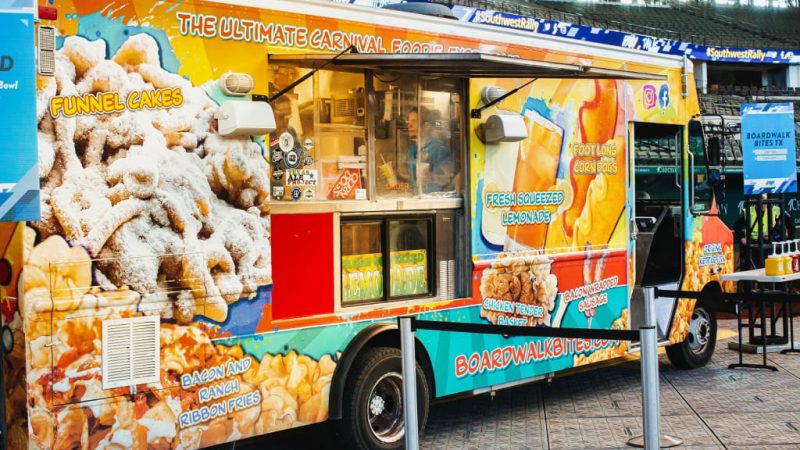With the food truck industry projected to exceed $2 billion in the U.S. by 2025, mobile food businesses are hotter than ever. From festivals and farmers’ markets to corporate parks and late-night crowds, food trucks provide flexibility, lower startup costs, and direct access to hungry customers.
If you’ve been thinking about buying a food truck, now’s the time. But before you sign the dotted line or head to a dealership, it’s crucial to understand the full process—from choosing the right truck to getting licenses and launching successfully.
In this guide, you’ll learn:
- Where to buy a food truck
- What to look for in a used or new unit
- Average costs and financing options
- Legal and health code requirements
- Tips for success after purchase
Step 1: Know What Type of Food Truck You Need
Before buying a food truck, determine what kind of setup suits your menu and business model.
Common Food Truck Types:
| Type | Best For |
| Standard Food Truck | Full-service cooking (burgers, tacos, grilled items) |
| Food Trailer | Requires towing; ideal for stationary locations |
| Food Cart/Kiosk | Limited cooking; good for snacks, drinks, or desserts |
| Step Van Conversion | Customizable and spacious, common in food truck fleets |
Key Factors to Consider:
- Size of kitchen (16–24 feet is standard)
- Gas vs. electric equipment
- Cooking appliances needed (griddle, fryer, fridge, etc.)
- Generator and power system
- Water and waste systems (clean, gray, black water tanks)
Step 2: Where to Buy a Food Truck
You have several options depending on your budget and customization needs.
Buy New (Custom-Built)
- Best for custom layouts and branding
- Cost: $75,000–$180,000
- Vendors: Prestige Food Trucks, Cruising Kitchens, M&R Trailers
Buy Used
- Budget-friendly and fast to launch
- Cost: $25,000–$80,000
- Sources: Craigslist, UsedVending.com, Roaming Hunger, Facebook Marketplace
Lease a Food Truck
- Lower upfront cost
- Great for testing the market
- Cost: $2,000–$3,000/month
Pro Tip: Always inspect used trucks in person. Check for rust, engine issues, outdated equipment, and local code compliance.
Step 3: Understand the Costs of Buying a Food Truck
Buying a food truck involves more than just the vehicle.
Total Startup Cost Estimate:
| Expense | Cost Range |
| Food Truck Purchase | $25,000 – $180,000 |
| Licenses & Permits | $1,000 – $5,000 |
| Equipment & Appliances | Included or $5,000+ |
| Initial Food Inventory | $500 – $2,000 |
| Branding & Wraps | $2,500 – $10,000 |
| POS System & Tech | $300 – $2,000 |
| Commissary Rental (monthly) | $300 – $1,500/month |
| Marketing & Website | $500 – $3,000 |
Step 4: Check Local Regulations and Licensing
Laws vary by city and state, so do this early to avoid legal issues.
Common Requirements:
- Business license
- Health department permit
- Mobile food vending permit
- Fire inspection and suppression system certification
- Vehicle registration and commercial insurance
- Commissary agreement (required in many cities)
Use your local health department or small business office to find specific requirements for your city (e.g., Los Angeles, New York, Houston, or Seattle).
Step 5: Inspect the Truck Before Buying
Whether you buy new or used, a thorough inspection is critical.
What to Check:
- Engine, transmission, and mileage
- Electrical and plumbing systems
- Exhaust and ventilation system
- Appliance condition and layout
- Generator power output
- Interior wear and tear
Consider hiring a mechanic and a food safety consultant for peace of mind.
Step 6: Financing Your Food Truck
Can’t pay in full? You have financing options.
Popular Food Truck Financing Methods:
- Bank or SBA Loans: Competitive rates, but require good credit
- Equipment Financing: The truck itself is collateral
- Leasing or Rent-to-Own: Flexible, but can cost more over time
- Crowdfunding: Platforms like Kickstarter or GoFundMe
- Personal Savings or Partnerships
Tip: Create a solid business plan before applying—it shows lenders you’re serious.
Step 7: Plan Your Launch & Operations
After buying the truck, it’s time to get customers.
Prepare:
- A winning menu with pricing strategy
- Inventory and food supplier agreements
- POS and payment setup (Square, Clover, Toast)
- Social media pages and website
- Local permits and event applications
Launch Ideas:
- Host a soft opening
- Attend food truck festivals or markets
- Partner with breweries, campuses, or business parks
- Offer promotions for first-time customers
Step 8: Scale & Grow After You Buy Your Food Truck
Ongoing Success Tips:
- Track daily sales and food cost margins
- Rotate menu items based on demand
- Request customer reviews and photos
- Join food truck associations for visibility
- Use Instagram, TikTok, and Yelp to build a following
- Explore catering, weddings, or corporate lunches
Conclusion
Buying a food truck is an exciting and rewarding path for culinary entrepreneurs. With lower overhead than a brick-and-mortar restaurant and direct access to your community, it’s a flexible way to turn your food dream into a real business.
By understanding what to look for, budgeting wisely, and following local laws, you can avoid costly mistakes and launch your mobile kitchen with confidence.
FAQs
1. How much does it cost to buy a food truck?
Used food trucks start at $25,000, while new, custom trucks can cost $75,000 to $180,000.
2. Can I buy a food truck and operate it anywhere?
No. You need city-specific permits and licenses to legally sell food from your truck.
3. Is it better to buy new or used?
Used trucks are cheaper and faster to launch, but new trucks offer reliability and customization.
4. Do I need a commissary kitchen?
In most cities, yes. Commissaries are required for food storage, cleaning, and prep.
5. Can I finance a food truck purchase?
Yes. SBA loans, equipment financing, leasing, and crowdfunding are popular options.
Also read: UPS Owner Operator Jobs: Opportunities, Requirements, Pay & How to Get Started









